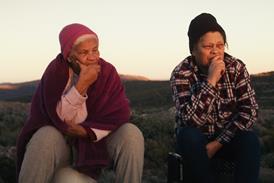Dir: Bernardo Bertolucci. UK. 2003. mins.
The Dreamers is not the masterpiece that some were expecting. But neither does it betray the return to form that was announced by Bernardo Bertolucci's 1998 chamber drama, Besieged. This is an infinitely more intelligent, edgy and intriguing film than, say, Little Buddha. Its main flaw is its inability to reconcile its two big themes, each embedded in two separate locations: the political ferment of the Paris Spring of 1968, which takes place in the street; and the menage a trois of a French brother and sister and their American friend, which is set in one of those huge Parisian family apartments that try to cram a mansion onto one floor of a hotel particulier. But those apartment scenes include a handful of moments that are as good as anything in Bertolucci's oeuvre. Commercially, The Dreamers is likely to do brisk business in Europe, particularly in France and Italy, where the explicit sex scenes and genitalia a-go-go will do little to harm its prospects. The US is a different ball game, as it were, and as we can safely assume that the director will refuse to cut a single pubic hair, bi-coastal indie distribution looks like the most obvious model.
There are two very good things about this film. One is the apartment itself, which is not just a backdrop but a significant presence, a conspirator. Even though it is the setting for three-quarters of the action, we never really find our bearings in this rambling, dog-eared, Directoire-style warren of rooms linked by dark, narrow corridors with abrupt angles. And this disorientation gives an unsettling depth to the central menage between twin brother and sister Theo (Louis Garrel) and Isabelle (Eva Green) and their guest Matthew (Michael Pitt, last seen in Lary Clark's Bully), an idealistic, innocent American abroad. The second very good thing is first-time actress Eva Green, whose role as Isabelle is perhaps the most difficult to pull off of the three, as her character is the most riven, the most brittle, veering as she does between femme fatale and stubborn, frightened little girl. Plus, she looks great naked: no small consideration in a film where all three main characters parade around in their birthday suits for so much of the time.
Oh, and there's a third very good thing: the late sixties hard rock soundtrack, from Joplin to Hendrix and back, which carries both the revolutionary adrenaline and the threatening, anarchic edge of these turbulent years; it also provides a neat counterpoint to all those straight-backed chairs and bronze candelabras. The film's other main import - its peppering of cinematic references and cut-in scenes from the kind of films that made Cahiers du Cinema critics go weak at the knees (Sam Fuller's Shock Corridor, Godard's Bande a part) - works less well. It had the Venice festival crowd grinning and nodding, but more secular audiences may find these homages irrelevant and distracting; they certainly add very little to the plot.
As it stands, the film is three parts Last Tango and one part Novecento. Bertolucci and his scriptwriter Gilbert Adair, whose novel The Holy Innocents provided the basis for the film, should have had the courage of their convictions, and left out the demonstrations and riot cops entirely, or kept them as background noise filtering through the shutters of the apartment. But in the end, the price of the ticket is justified by three marvellous scenes: Matthew's beautifully written and finely acted disquistion about the cosmic geometry of a cigarette lighter; Theo's sudden impulse to fry eggs while his friend and his sister have sex on the floor; the sidelight cast on Isabelle's character when Matthew finally gains entrance to the forbidden sanctum of her room, and her devastation, later in the same scene, when she hears her brother playing their special song to another girl. For this relief, much thanks.
Prod co: Recorded Picture Company
Co prod: Peninsular Films, Fiction
Int'l sales: HanWay
Prod: Jeremy Thomas
Scr: Gilbert Adair
Cinematography: Fabio Cianchetti
Prod des: Jean Rabasse
Ed: Jacopo Quadri
Main cast: Michael Pitt, Louis Garrel, Eva Green, Robin Renucci, Anna Chancellor.



















No comments yet